Crimean Veterans of Nottinghamshire
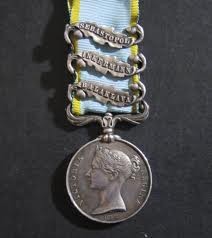
Crimean Medal
with the 3 clasps awarded to William Thompson: Sebastopol, Inkerman, Balaklava
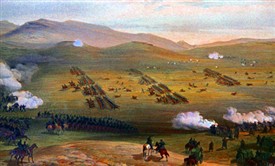
The Charge of the Light Brigade
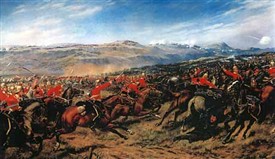
The Charge of the Heavy Brigade
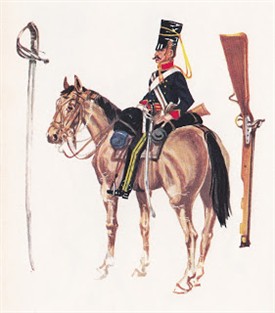
4th Light Dragoons in the Crimea
Daniel Deering's uniform in the Light Brigade Charge
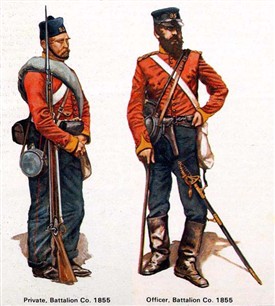
95th Foot (Derbyshire Regiment) in the Crimea
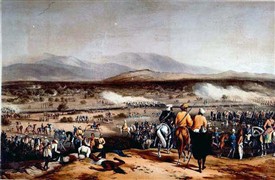
The Battle of Chillianwala
'We were licked that day...'
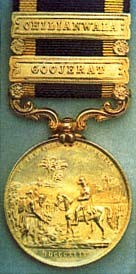
2nd Sikh War medal
with the clasps that William Thompson was awarded
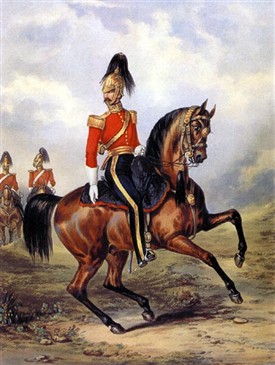
Officer of the 1st Royal Dragoons, William Thompson's regiment in the Crimea
He would have resembled the troopers in the background, no plume or shoulder tabs on campaign
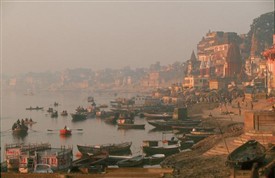
Benares/Varanasi
The River Ganges
By Ralph Lloyd-Jones
The Crimean War took place in 1854 – 1856, including the still-remembered Charge of the Light Brigade at the Battle of Balaklava (25 October 1854). By the turn of the 19th/20th Centuries survivors would have been in their 70s or 80s and newspapers often took note when they died, just as we have recently noted the passing of the last veterans of the 1914 – 18 War.
The Mansfield and North Notts Advertiser noticed the funerals of the following six Crimean veterans (of varying levels of actual contribution to the war) between 1903 and 1923:
30 January 1903:
One of the few remaining Crimean veterans was carried to God’s acre on Tuesday afternoon. The Rev. Blomefield, of St John’s , reading the words of prayer and consolation at the graveside. Private Thomas Leadbetter enlisted in the Scots Greys soon after the regiment had left Nottingham Barracks for the Crimea , and he was subsequently transferred to the Royal Artillery. He was at the capture of Sebastopol , and received medal and clasps for the campaign and another “good conduct” medal on leaving the army with a small pension. His age at death was 74, and Sergeant Dan Wade, R.A., another of our Crimean warriors, was among the little cortege which followed him to the cemetery grave on Tuesday. Mr. Leadbetter had of late years resided with his son-in-law, Mr. Brown, at Hazel Grove [Hucknall].
Unfortunately it looks as if Leadbetter had transferred to the Artillery before the Scots Greys were involved in the Charge of the Heavy Brigade at Balaklava, though casualties were high and he might not have survived had he still been a cavalry trooper.
3 June 1904:
The bugle notes of the “Last Post” and the firing of blank volleys impressively marked the internment of two local army veterans in the General Cemetery on Monday. One was Trooper Deering of the 4th Light Dragoons (of the immortal Six Hundred), and the other was James Hames, of the 95th Foot, who also saw service in the Crimea . A pathetic incident of the funeral was the presence of fourteen Crimean and Indian Mutiny veterans, feeble with the weight of years, but wearing their medals with conscious pride…
…Simultaneously the funeral of another army veteran – Thomas Francis – took place in Basford cemetery in the presence of a large and sympathetic assembly. Francis had had a noteworthy career, having taken part in campaigns in the Crimea , in China , in Syria , and in the Indian Mutiny, and was the proud owner of six medals and clasps.
The first of these three was Daniel Deering, born in Ireland 1825, whose death aged 79 was registered in Nottingham in June 1904. He was living on an army pension in St Ann’s with his wife Hannah in the 1901 census. As the paper noted, he really was in the Charge of the Light Brigade.
28 July 1911:
ANOTHER VETERAN GONE.
SUTTON WARRIOR WHO FOUGHT IN INDIA AND THE CRIMEA .
The ranks of the Nottingham and Notts Crimean and Indian Mutiny Veterans were thinned on Monday by the death at Sutton-in-Ashfield of William Thompson. The deceased, who was born at Chesterfield on March 1st, 1824 , enlisted at Chesterfield in March, 1846, in the 3rd Light Dragoons and served under the Duke of Wellington .
Thompson, who was tall and walked as straight as the days he served in the Army, in spite of his years, used to remark: “You soldiered in them days, fought blade to blade, not five miles off, on two meals a day and a penny per day for wages. To-day the soldiers are ‘toffs.’ If we made a slip on the field, say, pinched a bit of food from the enemy because we were hungry, you soon got your 50 lashes and a rough rub down with salt and water.”
He served under Lord Hugh Gough, in the Sikh Campaign in 1848-9, and fought at Chillianwalla [13 January 1849] and Goojerat. When speaking of the Sikh War he would look at his medal and point to the clasp for Chillianwalla and say: “We never ought to have had that bar, for we were licked that day. Mind you, we did our best, but I tell you we were licked, and don’t you forget it, they knowed about it later on.”
Thompson volunteered into the 1st Royals, in which he served in the Crimea, being present at Balaclava, Inkerman, and Sebastopol . He was discharged in 1866 at Aldershot.
On the recommendation of Sir Charles Seely…a pension of ninepence per day for life was obtained, and the Nottingham and Notts. Crimean and Indian Mutiny Veterans’ Association has for years paid his rent. He leaves behind a widow.
A beautiful piece of well-researched journalism, although he only ‘served under the Duke of Wellington’ in the sense that Wellington was Commander-in-Chief of the Army when he enlisted, never in the field. Three months before he died Thompson had been recorded in the census as ‘Oldage [sic] Pensioner’, living at 5 Little Duke Street, Sutton-in-Ashfield with his wife of 35 years, Ramie. They had no children. Unusually for the time, he was still illiterate and left X, his mark after someone else filled in the census form for him. Only a few weeks before his death he had attended a War Veterans' Dinner held to celebrate the Coronation of King George V at the Empress Rink in Nottingham on 20 June 1911.
As late as January 1923 we find:
CRIMEAN VETERAN’S DEATH.
MILITARY HONOURS AT MANSFIELD FUNERAL.
…the funeral took place at Mansfield Cemetery on Tuesday of a veteran of the Crimea and the Indian Mutiny, ex-Sergt.[William] Lacey, a native of Pleasley, who up to a year or two ago resided in Stockwell-gate. The old gentleman…served for many years in the cavalry, enlisting in 1855 in the 8th Royal Irish Dragoon Guards, a regiment which was annihilated almost to a man in the famous charge of the Light Brigade at Balaclava. He was trained with the 7th Hussars in York, and drafted out to the Crimea about the end of the same year, but arrived too late to take part in the fighting of that memorable campaign, for the Armistice was completed just as the troopship reached harbour… In 1857 at the time of the Indian Mutiny, Mr. Lacey volunteered to go with the 2nd Dragoon Guards to India, and was quartered at Cawnpore until after the fall of Lucknow, taking part in a couple of skirmishes with the enemy towards the close of the fighting… During his sojourn in India, Sergt. Lacey married a native girl, who bore him fifteen children, eleven of whom are still living. The couple celebrated their golden wedding in Mansfield in 1914, but Mrs. Lacey died four years later.
The old gentleman, who was 80 years of age, was well known and respected in the town…
By contrast with the 1911 obituary of Thompson, this is inaccurate in many ways. If he had died at 80, Lacey would have been born in 1843 and joined the army to go to the Crimea aged 12. Not impossible for a drummer-boy then, but in fact he had been born in 1837 and was 86 when he died. Nor was there any such unit as ‘the 8th Royal Irish Dragoon Guards’, though the 4th of that name were in the Heavy Brigade. Lacey's Indian wife appears in censuses as ‘Amelia Margaret’, perhaps an English version of her real Hindi name, though she may have been a Christian? She was born in Benares, now known as Varanasi in Uttar Pradesh. In the 1891 census the eleven surviving children (of 12 born alive, not 15) were still living with them at 29 Stockwell Gate, plus a daughter-in-law and one grandchild. William and his second son, James, were both Insurance Agents; eldest daughter Mary, aged 21, (who was born in Chunar, Uttar Pradesh) and son, Joseph, were both ‘Working at Jam Factory’. Fred, a son of 14 was ‘Working at Sweet Factory’, though the rest were ‘Scholars’, except for the babies 2 month old Margaret and the 5 month old granddaughter, Rose Hannah. A remarkable multi-ethnic household of fourteen in Victorian Mansfield.